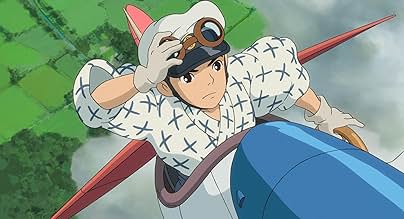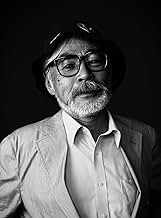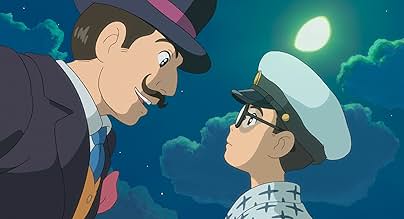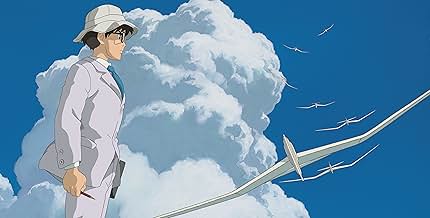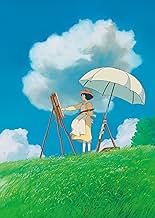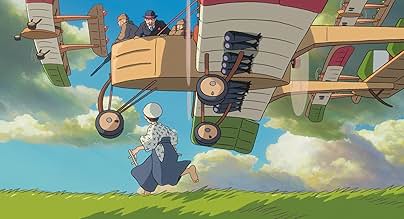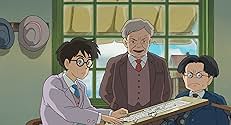Jiro Horikoshi studies assiduously to fulfill his aim of becoming an aeronautical engineer. As WWII begins, fighter aircraft designed by him end up getting used by the Japanese Empire agains... Read allJiro Horikoshi studies assiduously to fulfill his aim of becoming an aeronautical engineer. As WWII begins, fighter aircraft designed by him end up getting used by the Japanese Empire against its foes.Jiro Horikoshi studies assiduously to fulfill his aim of becoming an aeronautical engineer. As WWII begins, fighter aircraft designed by him end up getting used by the Japanese Empire against its foes.
- Nominated for 1 Oscar
- 26 wins & 54 nominations total
Hideaki Anno
- Jirô Horikoshi
- (voice)
Hidetoshi Nishijima
- Honjô
- (voice)
Miori Takimoto
- Naoko Satomi
- (voice)
Masahiko Nishimura
- Kurokawa
- (voice)
Jun Kunimura
- Hattori
- (voice)
Mirai Shida
- Kayo Horikoshi
- (voice)
Stephen Alpert
- Castorp
- (voice)
- (as Steve Alpert)
Shinobu Ôtake
- Kurokawa's Wife
- (voice)
Morio Kazama
- Satomi
- (voice)
Keiko Takeshita
- Jirô's Mother
- (voice)
Joseph Gordon-Levitt
- Jirô Horikoshi
- (English version)
- (voice)
John Krasinski
- Honjô
- (English version)
- (voice)
Emily Blunt
- Nahoko Satomi
- (English version)
- (voice)
Martin Short
- Kurokawa
- (English version)
- (voice)
Stanley Tucci
- Caproni
- (English version)
- (voice)
Mandy Patinkin
- Hattori
- (English version)
- (voice)
Mae Whitman
- Kayo Horikoshi
- (English version)
- (voice)
- …
Featured reviews
The Wind Rises is a fictionalized biography / character study of Jiro Hirikoshi and his story of becoming an Aviation Engineer. This movie had a great impact on me after seeing it in the theatre and I thought about what I had seen for the one hour drive home afterwards. In terms of pacing and how the movie focuses on the main character I was reminded of David Lean movies in its maturity and emotional grit. There were also times when watching that I thought to myself I have never seen hand drawn animation this good ever and will probably never see animation this good ever again. The character designs are beautiful. The backgrounds and color pallete are beautiful. The animation is breathtaking. But the story is just as beautiful as the artwork. The movie is about one mans journey to make beautiful airplanes but is also equally tragic in later scenes of the movie in the evolving love story and especially the last scene in the movie.
This movie does not explain at any time through dialogue what the character is feeling but instead it shows you and the subtle and at times powerful emotions which are the glue of what holds his story together. Some people may wonder why Miyazaki took creative risks with the real life story of Jiro Hirikoshi. The real life Jiro never married to a woman with Tuberculosis. Did he really fantasize about building airplanes? Was he really followed by a Soviet Spy? I think the way the character fantasizes about airplanes even when not dreaming is an honest depiction of how creative people like Hayao Miyazaki think.
Along with Porco Rosso this is probably Hayao Miyazaki's most personal movie. If you study Hayao Miyazaki's movies and read about his career like I have it becomes obvious that this movie is as much about Jiro Hirikoshi as it is about Hayao Miyazaki.
I recommend anyone who has ever been creative to go see the Wind Rises.
Hayao Miyazaki's Most Beautiful film.
This movie does not explain at any time through dialogue what the character is feeling but instead it shows you and the subtle and at times powerful emotions which are the glue of what holds his story together. Some people may wonder why Miyazaki took creative risks with the real life story of Jiro Hirikoshi. The real life Jiro never married to a woman with Tuberculosis. Did he really fantasize about building airplanes? Was he really followed by a Soviet Spy? I think the way the character fantasizes about airplanes even when not dreaming is an honest depiction of how creative people like Hayao Miyazaki think.
Along with Porco Rosso this is probably Hayao Miyazaki's most personal movie. If you study Hayao Miyazaki's movies and read about his career like I have it becomes obvious that this movie is as much about Jiro Hirikoshi as it is about Hayao Miyazaki.
I recommend anyone who has ever been creative to go see the Wind Rises.
Hayao Miyazaki's Most Beautiful film.
Aviation has always been a key element of the Studio Ghibli films; from the flying broomstick in Kiki's Delivery Service to the airborne armies in Howl's Moving Castle. So for Hayao Miyazaki's reported swan-song to focus on the development of aeroplane design is no surprise. A fictionalised biopic of designer Jiro Horikoshi, The Wind Rises is a stunning achievement, an animated film that uses the medium to tell a compelling, highly emotional story that has appeal for children and adults alike. Horikoshi's designs were used during World War 2, and that detail may make The Wind Rises unpalatable to some. But Miyazaki's films have never focused on battle-lines, but on the personal stories involved, and The Wind Rises gains power from the balancing of the beauty of the designs against the knowledge that the purpose for which the designs will be used leads to death and unhappiness. It's a bitter-sweet paradox, and one that many directors would sweep under the carpet. Instead, Miyazaki puts Horikoshi's dilemma centre-stage, and depicts the designer's angst as he finds himself immersed in industrial and international intrigue while he attempts to keep his own thinking pure. A subplot, invented for the film, relates how Horikoshi's work life is informed by his chaste romance with Naoko, a woman with tuberculosis who won't marry until she recovers. Horikoshi's dreams take flight while his day-to-day reality struggles to leave the ground behind. The Wind Rises stirs up sensational aerial dream sequences, but also captures the bleakness of life on the ground, as Tokyo recovers from a devastating earthquake. Horikoshi and Naoko journey to the Magic Mountain resort in an effort to address her physical malaise, and their interaction with a mysterious German spy, beautifully voiced by Werner Herzog, sketches out the sinister world of warmongering that forms the backdrop to their romance. Studio Ghibli films have always been beautiful to watch, and The Wind Rises excels in every frame. But the overriding message, about the role of a gifted individual to overcome the constraints of society, is just as beautifully wrought; The Wind Rises is required viewing for anyone who wants to have their spirits lifted and soar like the wind for two blissful hours.
Miyazaki's swan song, most likely. It's an animated biopic of Jiro Horikoshi, a Japanese aircraft engineer who developed the Zero, the plane which would eventually bomb Pearl Harbor and do kamikaze attacks in WWII. The man himself was a pacifist (at least according to this film). Most of the film just deals with the man's love for flight, which obviously makes the story very dear to Miyazaki. In fact, a good portion of the film takes place in Horikoshi's dreams, where he can invent any crazy contraption. First and foremost, the film is gorgeous. Though it mostly deals with the real world, it finds the beauty in it. As good as the film is, it isn't one of Miyazaki's best. It's a little long-winded and slow (definitely don't take your kids to it, even if they're big Ghibli fans). Miyazaki kind of neuters the militaristic history of Japan at that time. You can feel some terrible stuff going on in the background, but, outside of the Germans, whom our hero visits at one point, all the characters whom we meet are perfectly nice people. I would have liked a more detailed picture of history at the time. Also, the romance that is depicted in the film, which is entirely invented, is a tad too maudlin (though it is quite nice up front). And, though I won't hold it against the film itself, the English language dub is awful. This may be due to the film's specific, Japanese setting, but I really felt the voice actors were just dull as Hell. I hate to say it, but Joseph Gordon-Levitt in the lead role is the worst. The least offensive performances come from Martin Short and Mae Whitman (the latter is a professional voice actress who is great on Avatar: The Last Airbender, though she is best known for her role as Michael Cera's dull girlfriend Ann on Arrested Development). I wish I had just seen the subtitled version instead (it was playing here, but at an inconvenient theater). I might like the film better seeing it subtitled. All those criticisms don't amount to too much, though. It's a wonderful film.
I don't know if I loved it right from minute one, but then it doesn't quite start like any Miyazaki film (well, even with a dream scene). Its a little quieter, more natural, thoughtful and subdued, much like the main character will be through the film. And then earthquake hits. Its unlike anything you've seen in an animated film. It doesn't hype up its suspense or action. it simply shows Its protagonist, Jiro, react to a situation as calm and controlled as possible amid the debris and darkness and chaos, and help a couple of people in need. of course he doesn't know this young woman he saves will be an emotional foundation for his life. But as with any simple but splendid poetry we have a sense of the connection made.
Any other director might just make it a film about the 1920s earthquake that devastated Tokyo. Not Miyazaki. Soon after Tokyo is up and running and Jiro is after his passion which is airplanes. He dreams about them, and more than that dreams about the Italian icon of flying he looks up to as he gives Jiro advice and philosophical points about flying, inspiration and technology. And very soon after the film is more than anything about this man and his process - finding without any grandiose strokes what can make a plane fly quicker, faster, safer, with more agility and s look like no other. And, sometime soon, finding a love all his own.
Miyazaki has said (once again but probably for real this time) that he is done making films with the conclusion of the Wind Rises. If so, that's fine. I'm not sure if it's any sort of culmination of what his career has been or what he's said - Though you could certainly have a double feature with Porco Rosso, also about the wonder of flight but more in an adventure fantasy approach and have a fantastic several hours - and yet it's no less a marvel than anything else he's made. And if anything it just reveals more depths to how he feels for people and can show them in dimensions on screen than ever before. It is a biopic still, and a line here or there may be cornball, but so what. Its a fiercely intelligent film with genuine sentiment and a grace that comes from being a master letting your story unfold without rushing, letting scenes play out for full emotional weight, And ample colors and compositions painted with nostalgia for a mood (if not necessarily a side in history).
And yet you may think going in that there will be some sort of agenda politically speaking as it looks at a man who helped, ultimately, design planes that dropped bombs and shot and killed the US during world war two. It really isn't, or as simple as that. A couple of scenes with a German businessman of a sort voiced by Werner Herzog (yes the one and only, you'll know him when you hear him) lays out the futility in war and conflicts. And Jiro agrees. when someone speaks to him about what planes will be sent to fight whom, he is already resigned. "Japan will burn,' he says more or less. And yet he always stays more pragmatic, more about the work and the hard enough task to make the planes and make them fly high and well. This double edged sword also comes out when he is talking to his Italian guru in his dreams (especially the last one at the end of the war).
With all of this, the Wind Rises is a touching love story that seems possibly very doomed from the start - before getting engaged Jiro is told by Nahoko she has Tuberculosis and he doesn't care, or at least about that deterring him away - and how strong their bond is. How often do we get to see people in a movie, animated or otherwise, act like this to one another with kindness and compassion and a tenderness that (for the most part, maybe there's a bit of that "Japanese Disney" schmaltz but not much) is without any reservation? Not often really, at least like this as told at times without words at all; the high point of the picture is when there is a kind of wordless courtship as Jiro flies a paper plane around and it goes to the girl and she flies it back out as he chase to catch it and it repeats. The moving music, the amiable tone of the whole set piece, the mild peril... I'm at a loss to how much that just works because it feels true.
Did I mention its among the ten most beautifully animated films ever made? And I'm sure that group includes Mononoke and Totoro already. And I know full well a term like 'beautiful" is overused and tired. But Miyazaki crafts his works (or did) by hand with gorgeous, clear lines, water colors and maybe some cgi, and it both serves the story and its own sense of the world it's in: the earthy greens, the shiny clouds and blue skies, the metallic force of the planes, the drab grays of the offices and plane hangers. And yet you are still wrapped up in the tale of this man and those who cared about him or were inspired by and led by him, and is another rarity (easier to pull off in literature, trickier here and Miyzaki just about pulls it off): a mild wind that grows with power and energy, briefly, and then ebbs and flows with reality and, again, thought.
Any other director might just make it a film about the 1920s earthquake that devastated Tokyo. Not Miyazaki. Soon after Tokyo is up and running and Jiro is after his passion which is airplanes. He dreams about them, and more than that dreams about the Italian icon of flying he looks up to as he gives Jiro advice and philosophical points about flying, inspiration and technology. And very soon after the film is more than anything about this man and his process - finding without any grandiose strokes what can make a plane fly quicker, faster, safer, with more agility and s look like no other. And, sometime soon, finding a love all his own.
Miyazaki has said (once again but probably for real this time) that he is done making films with the conclusion of the Wind Rises. If so, that's fine. I'm not sure if it's any sort of culmination of what his career has been or what he's said - Though you could certainly have a double feature with Porco Rosso, also about the wonder of flight but more in an adventure fantasy approach and have a fantastic several hours - and yet it's no less a marvel than anything else he's made. And if anything it just reveals more depths to how he feels for people and can show them in dimensions on screen than ever before. It is a biopic still, and a line here or there may be cornball, but so what. Its a fiercely intelligent film with genuine sentiment and a grace that comes from being a master letting your story unfold without rushing, letting scenes play out for full emotional weight, And ample colors and compositions painted with nostalgia for a mood (if not necessarily a side in history).
And yet you may think going in that there will be some sort of agenda politically speaking as it looks at a man who helped, ultimately, design planes that dropped bombs and shot and killed the US during world war two. It really isn't, or as simple as that. A couple of scenes with a German businessman of a sort voiced by Werner Herzog (yes the one and only, you'll know him when you hear him) lays out the futility in war and conflicts. And Jiro agrees. when someone speaks to him about what planes will be sent to fight whom, he is already resigned. "Japan will burn,' he says more or less. And yet he always stays more pragmatic, more about the work and the hard enough task to make the planes and make them fly high and well. This double edged sword also comes out when he is talking to his Italian guru in his dreams (especially the last one at the end of the war).
With all of this, the Wind Rises is a touching love story that seems possibly very doomed from the start - before getting engaged Jiro is told by Nahoko she has Tuberculosis and he doesn't care, or at least about that deterring him away - and how strong their bond is. How often do we get to see people in a movie, animated or otherwise, act like this to one another with kindness and compassion and a tenderness that (for the most part, maybe there's a bit of that "Japanese Disney" schmaltz but not much) is without any reservation? Not often really, at least like this as told at times without words at all; the high point of the picture is when there is a kind of wordless courtship as Jiro flies a paper plane around and it goes to the girl and she flies it back out as he chase to catch it and it repeats. The moving music, the amiable tone of the whole set piece, the mild peril... I'm at a loss to how much that just works because it feels true.
Did I mention its among the ten most beautifully animated films ever made? And I'm sure that group includes Mononoke and Totoro already. And I know full well a term like 'beautiful" is overused and tired. But Miyazaki crafts his works (or did) by hand with gorgeous, clear lines, water colors and maybe some cgi, and it both serves the story and its own sense of the world it's in: the earthy greens, the shiny clouds and blue skies, the metallic force of the planes, the drab grays of the offices and plane hangers. And yet you are still wrapped up in the tale of this man and those who cared about him or were inspired by and led by him, and is another rarity (easier to pull off in literature, trickier here and Miyzaki just about pulls it off): a mild wind that grows with power and energy, briefly, and then ebbs and flows with reality and, again, thought.
The film is an interesting melange of Japanese literature, culture and history. It will also disappoint many of Miyazaki's fantasy fans, as this is a biographical movie. In truth, it is based on two different works, one is the diary of the aeronautical engineer who designed the famous Japanese Zero fighter, and the other is a story of two girls in a tuberculosis sanatorium (in truth, Jiro's wife did not have TBC).
Yet the details capture also some of the things closer to Miyazaki's heart: a commentary on the current state of Japan, a hopeful dream for a person who is losing his sight and his passion for flying and for kind independent young women. All in all it might feel a little dry sometimes, but only until you understand that the source material was a diary that has 80% of it containing aeronautical design ideas and calculations.
Perhaps a two hour film about a quiet dreamer of plane designs is not what I would have chosen for Miyazaki's last animation movie, but it wasn't my choice after all. While his artistic expression cannot be stopped - he is still drawing manga and doing other stuff - he publicly announced that this would be his last film, the reason being his worsening eyesight. Considering the first scene of the movie is of a myopic boy who dreams of flying a plane and then crashing because he can't see well, I would say that's a pretty direct statement from the genius animator.
It doesn't matter if I recommend this movie or not. If you are a fan of Ghibli and Miyazaki you will watch it anyway, while if you are not, you can try some other stuff of his, become a die hard fan, and find yourself in a situation already solved previously (that's engineering humor, BTW)
Yet the details capture also some of the things closer to Miyazaki's heart: a commentary on the current state of Japan, a hopeful dream for a person who is losing his sight and his passion for flying and for kind independent young women. All in all it might feel a little dry sometimes, but only until you understand that the source material was a diary that has 80% of it containing aeronautical design ideas and calculations.
Perhaps a two hour film about a quiet dreamer of plane designs is not what I would have chosen for Miyazaki's last animation movie, but it wasn't my choice after all. While his artistic expression cannot be stopped - he is still drawing manga and doing other stuff - he publicly announced that this would be his last film, the reason being his worsening eyesight. Considering the first scene of the movie is of a myopic boy who dreams of flying a plane and then crashing because he can't see well, I would say that's a pretty direct statement from the genius animator.
It doesn't matter if I recommend this movie or not. If you are a fan of Ghibli and Miyazaki you will watch it anyway, while if you are not, you can try some other stuff of his, become a die hard fan, and find yourself in a situation already solved previously (that's engineering humor, BTW)
Did you know
- TriviaHuman voices are largely used as sound effects, such as engine roars and earthquake sounds.
- GoofsAfter Jiro tells Nahoko that he's finished designing his plane, he falls asleep. Nahoko removes his glasses and places them on the floor behind their heads. In the next shot, from behind their heads, there are no glasses on the floor.
- Crazy credits[A quote in French from a poem by Paul Valéry that appears as a caption at the start of the movie.] The wind is rising! We must try to live!
- ConnectionsEdited into Miyazaki Dreams of Flying (2017)
- SoundtracksHikouki-gumo
(Contrails)
Written by Yumi Matsutôya (as Arai Yumi)
Performed by Yumi Matsutôya (as Arai Yumi)
Courtesy of Toshiba EMI (Universal Music Japan)
Details
- Release date
- Country of origin
- Official sites
- Languages
- Also known as
- Se levanta el viento
- Production companies
- See more company credits at IMDbPro
Box office
- Budget
- $30,000,000 (estimated)
- Gross US & Canada
- $5,209,580
- Opening weekend US & Canada
- $313,751
- Feb 23, 2014
- Gross worldwide
- $137,091,048
- Runtime
- 2h 6m(126 min)
- Color
Contribute to this page
Suggest an edit or add missing content







